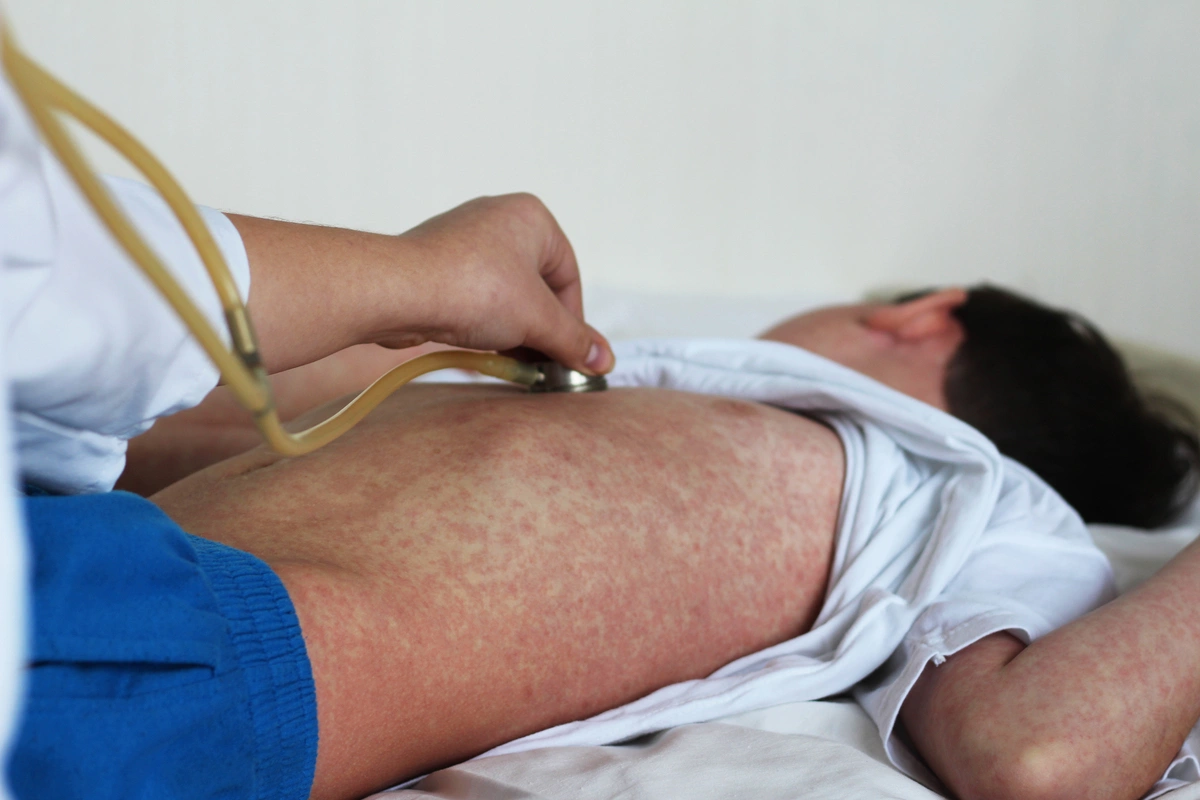
Over 20,000 cases of measles have been recorded in Kazakhstan. The government urges the population to get vaccinated while the hospitals struggle to fit patients. The latest measles epidemic in the country has shed light on poor vaccination policies and the rise of anti-vaxxers in the country.
Image: fotohay/Shutterstock
On 6 December, the head of the National Center for Public Health of the Ministry of Health of the Republic of Kazakhstan, Manar Smagul, briefed the press on the growing number of measles cases in the country. Of over 20,000 recorded cases, 81% are among children under 14, 3.4% are adolescents, and 15.4% are adults.
With the first measles cases registered in March this year, the Ministry of Health, unable to prevent its further spread, started mass immunization only in November. Today, cases of measles have been identified in every region of the country.
According to the chief state sanitary doctor, Aizhan Esmagambetova, Almaty and Shymkent are the leading cities with the highest number of cases. Among the infected, the most cases are in unvaccinated people. However, despite the government urging people to get vaccinated, the rising anti-vaxxing propaganda on social media is influencing people to avoid vaccination due to them being manufactured in India, DW reports. Deputy Prime Minister Tamara Duysenova pointed out that the reason lies in the lack of awareness of the importance of vaccines in Kazakhstan.
Back in April, it was reported that 100 cases have been confirmed. However, the head of the Ministry of Health, Azhar Giniyat, shrugged it off by declaring that there was no epidemic in the country. According to Giniyat, “the first cases were imported from Turkey, Russia, and Egypt.” The infected were unvaccinated children who had no immunity against the virus.
The vaccination against measles is among eleven mandatory ones in Kazakhstan. It must be done twice in a child’s life—once at twelve-fourteen months and the second time at the age of six. However, as the number of anti-vaxxers, precisely parents, is growing worldwide, it is not surprising that this mentality has reached Kazakhstan.
According to a study by Human Vaccines and Immunotherapeutics in the U.S., Canada, and the UK, only seven percent of respondents in the U.S. and Canada were against vaccinations, while in the UK, it was only three percent. While analyzing anti-vaxxers, it was determined that those without a university education were more likely to be against vaccines. The group of 25–49-year-olds were the most hesitant towards the vaccines, which, as specified by the report, is the group most likely to be parents statistically.
As these fears and mistrust spread around the world, so does the increase in measles cases. On 25 November, The Guardian published an article in which reporter Shanti Das explored the link between anti-vaxxers’ conspiracies online and the increase in measles cases in the UK. The comments about “fear-mongering,” “poison,” and “bioweapons” that anti-vaxxers leave on social media or under mainstream media articles are overwhelming proof of the “mistrust of the media, health services, and the government” by the public in the UK.
In another Caspian country, Azerbaijan, measles cases have also been on the rise. The country’s chief consultant of the TABIB Department of Infection Prevention and Control, Turan Ibrahimova, reported that it is the result of children not getting vaccinated during the COVID-19 pandemic, AZTV reports.
However, compared to Kazakhstan, the Azerbaijani numbers are far less concerning. According to Report.az, at the end of November, there were 284 cases of measles this year in total. Yet, it doesn’t make this outbreak less troubling for the most. On 5 December, a 10-year-old girl died from measles, becoming the fifth child to die from it in two weeks in Azerbaijan. Due to children being the most affected by this current outbreak, some schools switched to distance learning.
Like Kazakhstan, children in Azerbaijan are supposed to get vaccinated twice in their lives—at the age of one and six. On 6 December, Azerbaijan’s Ministry of Health urged people to get their children vaccinated.
At the beginning of November, Kazakhstan’s Deputy Chairwoman of the Committee for Sanitary and Epidemiological Control of the Ministry of Health, Zaure Akhmetova, stated at a press conference that 84% of the sick children were unvaccinated. While the mass vaccination against measles is in full swing—with 22,144 people reportedly vaccinated on 6 December—there is an ongoing registration of refusals as well.
Kazakhstan’s last major measles outbreak was in 2019, with over 13,000 cases. Similarly to the current situation, 83% of infected children—out of a total of over 9000 measles cases among children—were not vaccinated. In 2020, a study by UNICEF, funded by USAID, found that among the leading causes of vaccine hesitation were “vaccine misinformation, false contraindications, and medical exemptions.” The further partnership of USAID and UNICEF provided World Health Organization training for over 700 health workers in Kazakhstan. Additionally, in 2021, UNICEF launched a website in Kazakh and Russian with factual evidence of the importance of the vaccines, a calendar reminding parents when their children are supposed to receive a certain vaccine, and debunking the myths and misconceptions regarding the vaccines.
Despite the efforts of Western organizations, we are witnessing yet another measles outbreak in the country, with the same percentage of unvaccinated children among infected and a growing mistrust in the government. This is the highest measles epidemic in Kazakhstan since its independence—compared to the 2005 outbreak (16,118 cases) and the 2019 outbreak (13,326 cases). The highest number of cases in Kazakhstan (43,126) was recorded in 1982 when the country was part of the Soviet Union.
Share on social media